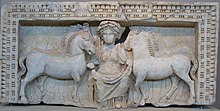Aranyani is a goddess of the forests and the animals that dwell within them.
Aranyani has the distinction of having one of the most descriptive hymns in the Rhg Ved dedicated to her. She is described as elusive, fond of quiet glades in the jungle, and fearless of remote places. Indeed the supplicant entreats her to explain, how she wanders, so far from the fringe of civilisation, without becoming afraid or lonely. She is adorned with anklets of bells and is seldom seen but more often heard as the tinkling of her anklets echos through the dark forest. She is also described as a dancer. Her worship has declined in modern day Hinduism, and it is rare to find a temple dedicated to Aranyani.
Wednesday, 22 December 2010
Monday, 13 December 2010
Dagda God
The Dagda was the father God of the Celts they called him the Good God because he protected their crops. He was king of the Tuatha Dé Danann and ruled over Uisnech in Co. Meath. He had a cauldron called the Undry which supplied unlimited food and was one of the magical items the Tuatha brought with them when they first landed on Ireland. He also had a living oak harp called Uaithne which caused the seasons to change in their order and also played three types of music, the music of sorrow, the music of joy and the music of dreaming.
He was portrayed as wearing a brown low-necked tunic which just reached his hips and a hooded cape that barely covered his shoulders. On his feet were horse-hide boots. Behind him he pulled his eight pronged war club on a wheel, one end of the club killed the living and the other end revived the dead, and when it was dragged behind him it left a track as deep as the boundary ditch between two provinces.
There are many humorous tales about him, about his appetites both for food and sexual gratification. In these stories he never seems to get enough of either!
Goddess Epona

Epona was a protector of horses, donkeys, and mules.
She was particularly a goddess of fertility, as shown by her attributes of a patera, cornucopia, ears of grain and the presence of foals in some sculptures suggested that the goddess and her horses were leaders of the soul in the after-life ride, with parallels in Rhiannon of the Mabinogion.
Unusually for a Celtic deity, most of whom were associated with specific localities, the worship of Epona, "the sole Celtic divinity ultimately worshipped in Rome itself,was widespread in the Roman Empire between the first and third centuries CE.
Usha Devi
The Goddess of Dawn is an important and favourite Vedic Deity. It is the goddess who stirs all creatures and makes them move in this world. The goddess is borne on a chariot. She not only dispels darkness and brings light to mankind but at the same time she brings happiness, hope and all other good things to mankind. She is the goddess of light and beauty and was invoked by the Risis of early age for their protection.
Usha has been described in the Rig Veda as the first self-effulgent white-complexioned though sprung from darkness; as the Mother of the Gods and of the Sun, "Immortal" and "Undecaying" ; as possessing perpetual youth "whiterobed"; Doer of good, bright-coloured, "the daughter of Night" and "the leader of the gods, advancing like a warrior armed with bright weapons" ; as "the wife of the Sun" and "the daughter of Agni" or Prajapati, as explained by Yaska ; as ``dark-complexioned at first, and white-complexioned afterwards," "the leader of all living creatures" and "the sister of Night"; as "the daughter of heaven"; as "the ancient"; as "deserving the homage of all and as "the ancient youthful damsel"; as "the destroyer of darkness"; as "golden-coloured"; as "the lord of all"; and as "the one who issued forth after breaking the strong gates or barriers of the Mountain".
In Usha of Rig Veda all the attributes of the Pauranic Durga or Uma are found. She is represented as Navayauvanasampanna (possessing perpetual youth): Sarvabharanabhushita (decked in gold); Puratani (ancient); Hiraumayi (golden-complexioned); Shiva (doer of good); Kali (dark-complexioned); Asuranasini (destroyer of the powers of darkness); Vividhayudhadharini (like a warrior armed with bright weapons): Davamata (mother of the Gods); Dakshakanya (the daughter of Prajapati) Giribala (issuing forth after breaking the strong barriers of the mountain) and so forth.
Goddess Usha is among the few goddesses which have been mentioned in the Rig Veda. The goddess symbolises giving up of all negative energies and taking all positive vibes into the life.
Subscribe to:
Comments (Atom)
